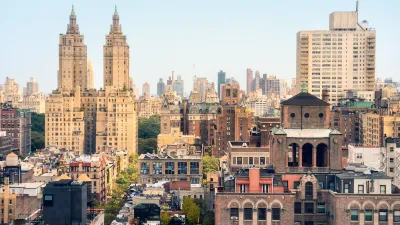Kenneth T. Jackson of the New York Times expresses his opposition to recent density concerns in New York City, which he believes are compromising its future as the world’s greatest city.
In New York City, there has been a “growing local attitude that favors the old over the new, stability over growth, the status quo over change and short buildings over tall ones,” highlighted by recent opposition to the New York Department of City Planning’s proposal to rezone 73 blocks on the East Side of Manhattan (an area known as “East Midtown”) to allow for newer and bigger skyscrapers.
This “skyscraper phobia” is based on three main arguments: “that the city is already overdeveloped, that subways and trains cannot support more riders, and that new development will threaten historically significant structures.”
In this opinion piece, Jackson argues that density in neighborhoods with good public-transit options is actually a good thing, as it is what attracts outsiders to Manhattan in the first place. He also provides various data to claim that the New York Metropolitan Transit Authority could actually handle more riders, as “the number of patrons is still about 360 million per year fewer than in 1947 (2 billion riders then versus about 1.6 billion in 2012).” He debunks the third argument by claiming that the city’s historic preservation efforts have moved well beyond its original purpose, and believes that those leading preservation efforts “would be happy to stop any change at all between 59th Street and 125th Street.”
Jackson concludes that: “Those who oppose changes like the East Midtown plan may love New York, but they don’t understand that they are compromising its future as the world’s greatest city, because “a vital city is a growing city, and a growing city is a changing city.”
FULL STORY: Gotham’s Towering Ambitions

Montreal Mall to Become 6,000 Housing Units
Place Versailles will be transformed into a mixed-use complex over the next 25 years.

Planetizen Federal Action Tracker
A weekly monitor of how Trump’s orders and actions are impacting planners and planning in America.

DARTSpace Platform Streamlines Dallas TOD Application Process
The Dallas transit agency hopes a shorter permitting timeline will boost transit-oriented development around rail stations.

Interactive Map Reveals America's “Shade Deserts”
Launched by UCLA and American Forests to combat heat-related deaths, the tool maps the shade infrastructure for over 360 U.S. cities.

Bicycles and Books — In Sacramento, Libraries Now Offer Both
Adult library card holders can check out e-bikes and e-trikes for up to one week.

Colorado Landfills Emit as Much Pollution as 1M Cars
Landfills are the third-largest source of methane pollution in Colorado, after agriculture and fossil fuel extraction.
Urban Design for Planners 1: Software Tools
This six-course series explores essential urban design concepts using open source software and equips planners with the tools they need to participate fully in the urban design process.
Planning for Universal Design
Learn the tools for implementing Universal Design in planning regulations.
City of Mt Shasta
City of Camden Redevelopment Agency
City of Astoria
Transportation Research & Education Center (TREC) at Portland State University
City of Camden Redevelopment Agency
Municipality of Princeton (NJ)
Regional Transportation Commission of Southern Nevada





























